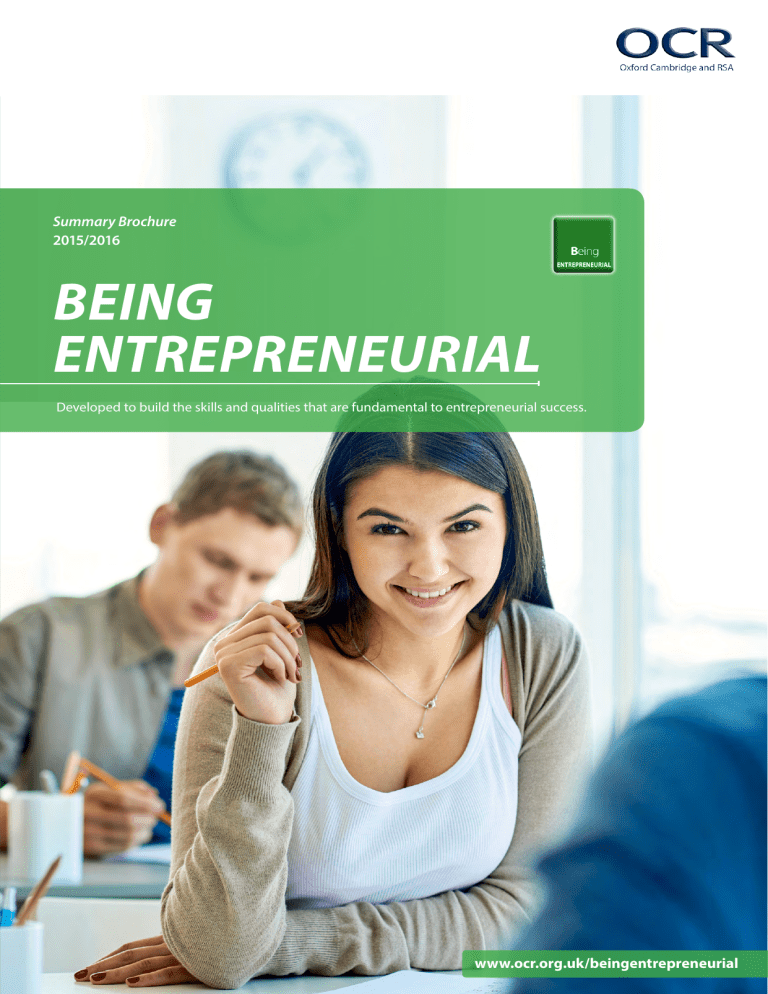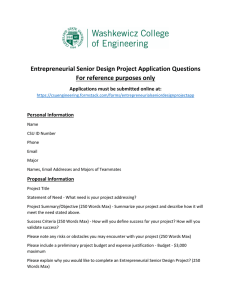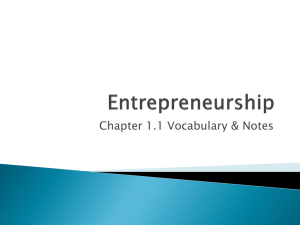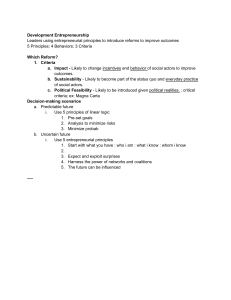
Summary Brochure 2015/2016 BEING ENTREPRENEURIAL Developed to build the skills and qualities that are fundamental to entrepreneurial success. www.ocr.org.uk/beingentrepreneurial BEING ENTREPRENEURIAL Summary Brochure OCR is a not-for-profit organisation. For us, success is measured through the impact and reach of our activities and the scale of our contribution in helping students realise their aspirations. Our purpose is to work in partnership with others to provide general and vocational qualifications that support education in ways that enable students to reach their full potential, equip them with the knowledge and skills they need for their future, and to recognise and celebrate their achievements. Who are these aimed at: These qualifications are for young people aged 14+ as well as adult learners. Advantages: • The qualifications are robust – we’ve worked with employers and entrepreneurs in their design We develop our qualifications in close consultation with teachers, industry leaders and government to ensure they are relevant for today’s students and meet requirements set by the Office of Qualifications and Examinations Regulation (Ofqual). • The Cambridge Approach to Assessment means that you can be confident in the quality of these qualifications and their suitability for the world of work • Level 2 and Level 3 qualifications can be delivered at the same time • We offer comprehensive support for teaching – no need to be a business specialist to deliver these qualifications successfully • The Level 3 Award in Being Entrepreneurial – Evaluating and Pitching Opportunities attracts 30 UCAS tariff points*. *It is always important to check individual course requirements when applying to university 3 4 BEING ENTREPRENEURIAL Summary Brochure The Qualification Levels OCR Unit No Unit Title Unit Reference Number 1 Pitching ideas to others H/505/3907 2 2 20 2 Identifying viable opportunities K/505/3908 2 10 60 3 Evaluating viable opportunities K/505/3908 3 10 60 Level Credit GLH glh = guided learning hours How they’re delivered At 60 guided learning hours, teaching could be delivered in a variety of ways: over one or two terms or as part of an intensive burst of activity for a citizenship campaign, for example. The qualifications can be used to fill gaps in learning programmes to enrich your learners’ curriculum and aid their employability. They include practical, engaging and interactive learning activities – we offer a comprehensive set of resources and teaching materials. These qualifications can also complement enterprise challenges through helping to develop underpinning skill sets whilst offering an accredited outcome which offers UCAS points. BEING ENTREPRENEURIAL Summary Brochure UNITS – AIMS AND PURPOSE Assessment and moderation Our Being Entrepreneurial qualification is centre assessed & externally moderated by us. You can claim when the student is ready so you’re not restricted to set dates and times. Assessors will ensure each learner has met all of the learning outcomes and assessment criteria before submitting the evidence for moderation. 5 6 BEING ENTREPRENEURIAL Summary Brochure Unit 1 – Pitching Ideas to Others Unit Title Being Entrepreneurial – Pitching Ideas to Others OCR unit number 1 Level 2 Guided learning hours 60 The aim of this unit is for learners to develop the skills required to pitch an idea to others. By the end of this unit learners will be able to identify a range of verbal and non‐verbal communication skills that are required to deliver a pitch. The learners will plan and create a final pitch that they will deliver. Throughout this process they will review their planning in order to refine and finalise their pitch. The delivery of the pitch will enable them to demonstrate the use of a range of verbal and non‐verbal communication skills and answer questions about their pitch. Finally, they will review their own delivery and identify ways they could improve. Learning Outcomes Assessment Criteria Teaching Content Text that follows i.e. is mandatory and must be taught. Text that follows an e.g. is optional and illustrative. The learner will: The learner can: 1Understand a range of communication skills used for pitching 1.1Identify a range of verbal communication skills • i.e. verbal communication skills (e.g. pace, volume, projection, pitch and tone, questioning, answers) 1.2Identify a range of non‐verbal communication skills 1.3Explain when verbal and non‐verbal communication skills should be used to pitch ideas 2Be able to plan a pitch for an idea 3Be able to deliver a pitch to others • i.e. non‐verbal communication skills (e.g. demonstrating – how to do something, how something works, signs, signals and gestures, eye contact, body language, positioning) • i.e. use of tools to aid communication (e.g. visual aids, memory aids, demonstration aids) • i.e. when verbal and non‐verbal communication would be used (e.g. different circumstances when methods of communication would be selected) 2.1Create a pitch to communicate their idea • i.e. deliver – delivery of a pitch that is fit for purpose using an appropriate range of verbal and non‐verbal communication skills 2.2Finalise their pitch taking into consideration feedback from others • i.e. answer questions about the pitch from others 3.1Pitch their idea to others • i.e. deliver – delivery of a pitch that is fit for purpose using an appropriate range of verbal and non‐verbal communication skills 3.2Respond to questions on their pitch • i.e. answer questions about the pitch from others 4Be able to review their delivery of a pitch 4.1Assess their use of: • communication skills • methods used to communicate the idea • responses to questions during a pitch 4.2Identify ways to improve their delivery • i.e. self‐review (e.g. what went well, what did not go well) • i.e. gaining feedback from others (e.g. accepting and using constructive feedback from others) • i.e. identify improvements (e.g. what would be changed for next time) BEING ENTREPRENEURIAL Summary Brochure Unit 2 – Identifying Viable Opportunities Unit Title Being Entrepreneurial – Identifying Viable Opportunities OCR unit number 2 Level 2 Guided learning hours 60 The aim of this unit is for learners to know what it takes to be entrepreneurial and to find out if they have the entrepreneurial mind and skill sets that are valuable to individuals, teams and employers. This set of skills can be applied to all aspects of everyday life. They will be able to identify viable opportunities which could include solutions to a problem, to meet a need, or fill a gap in the market. By the end of the unit they will be able to communicate to others why the opportunity is viable. Learning Outcomes Assessment Criteria Teaching Content Text that follows i.e. is mandatory and must be taught. Text that follows an e.g. is optional and illustrative. The learner will: The learner can: 1Know what it takes to be entrepreneurial 1.1Identify entrepreneurial mind sets • i.e. entrepreneurial mind sets: (e.g. self-belief, taking initiative, risk-taking, determination, resilience/attitude to failure, persistence, creativity/ innovation, ethical responsibility, vision, passion/energy/spirit, willingness to seek advice and help) 1.2Identify entrepreneurial skill sets • i.e. entrepreneurial skill sets: (e.g. problem solving, planning/organisation, risk management, people skills, communication, research, selling, negotiating, networking, customer service, financial awareness, leadership, ability to multi-task, coping with change) 2Be able to review own entrepreneurial mind and skill sets 2.1Carry out a personal audit of their own entrepreneurial mind and skill sets • i.e. personal audit against the entrepreneurial mind and skill sets: (e.g. personality traits, skills audit, self-analysis, gain feedback from others, use feedback from others) 3Be able to identify feasible opportunities for a specified scenario 3.1Identify feasible opportunities through either techniques or approaches • i.e. techniques: (e.g. deliberate creativity, lateral thinking, mind mapping, visualisation) • i.e. approaches: (e.g. problem solving: identifying an opportunity by finding a solution to a problem, accidental: identifying an opportunity by chance, imitation, innovation) • i.e. feasible: means that the proposal could be possible 4Be able to identify viable opportunities 4.1Describe the potential benefits of opportunities • i.e. benefits (e.g. financial rewards, non-financial rewards, benefits to others, social benefits, environmental benefits) 4.2Identify potential barriers and risks to opportunities • i.e. barriers (e.g. lack of resources, poor time management, poor planning, lack of support, lack of entrepreneurial mind and skill sets) 4.3Describe the potential impact of the barriers and risks to opportunities • i.e. risks (e.g. what could go wrong, no demand, escalating costs, lack of resources, competitors) 4.4Explain why an opportunity is viable • i.e. is the opportunity viable? (e.g. practicality, resources, time, cost, is it capable of working successfully?) • i.e. explain why an opportunity is viable – using the information from the benefits, barriers and risks to help select and justify a viable opportunity 7 8 BEING ENTREPRENEURIAL Summary Brochure Unit 3 – Evaluating Viable Opportunities Unit Title Being Entrepreneurial – Evaluating Viable Opportunities OCR unit number 3 Level 3 Guided learning hours 60 The aim of this unit is for learners to understand what it takes to be entrepreneurial and assess their own entrepreneurial mind and skill set which are valuable to individuals, teams and employers. This set of skills can be applied to all aspects of everyday life. They will be able to evaluate the feasibility of opportunities to identify a viable opportunity and understand how to overcome barriers and risks. Opportunities could include solutions to a problem, to meet a need, or fill a gap in the market. By the end of the unit they will be able to hold dialogue with others to seek support for their opportunity. BEING ENTREPRENEURIAL Summary Brochure Learning Outcomes Assessment Criteria Teaching Content Text that follows i.e. is mandatory and must be taught. Text that follows an e.g. is optional and illustrative. The learner will: The learner can: 1Understand what it means to be entrepreneurial 1.1Analyse why entrepreneurial mind sets are important to entrepreneurial activities • i.e. entrepreneurial mind sets: (e.g. self-belief, taking initiative, risk-taking, determination, resilience/attitude to failure, persistence, creativity/ innovation, ethical responsibility, vision, passion/energy/spirit, willingness to accept advice and/or help) 1.2Analyse why entrepreneurial skill sets are important to entrepreneurial activities • i.e. entrepreneurial skill sets: (e.g. problem solving, planning/organisation, risk management, people skills, communication, research, selling, negotiating, networking, customer service, financial awareness, leadership, ability to multi-task, managing change) • i.e. why the entrepreneurial mind and skill sets are important: (e.g. application, impact, consequences, benefit to individuals, team and/or employers) • i.e. entrepreneurial activities – the mind and skill sets required of those involved in entrepreneurial activity (e.g. improve processes, enhance ideas, add value, create and innovate) 2Be able to assess own entrepreneurial mind and skill sets 2.1Assess the strengths and weaknesses of their own entrepreneurial mind and skill sets • i.e. self-assessment against the entrepreneurial mind and skill sets (e.g. gap analysis, online testing, personality traits, skills audit, gain feedback from others, use feedback from others, understanding strengths and weaknesses) • i.e. assessment of strengths and weaknesses (e.g. what they are good at, why they are good at them, why it is important to have these strengths. What they are not good at, why they feel they are not good at them, what impact this could have) 3Be able to apply techniques and approaches in the identification of feasible opportunities 3.1Explain how techniques and approaches are used to identify opportunities 3.2Identify opportunities through techniques and approaches • i .e. techniques: (e.g. deliberate creativity, lateral thinking, mind mapping, visualisation, SCAMPER [Substitute, Combine, Adapt, Modify, Put to another use, Eliminate, Reverse]) • i .e. approaches: (e.g. problem solving: identifying an opportunity by finding a solution to a problem, accidental: identifying an opportunity by chance, imitation, innovation) • i.e. feasible: means that the proposal could be possible 4Be able to evaluate the viability of opportunities 4.1Analyse the potential benefits of opportunities • i.e. benefits (e.g. non-financial rewards, benefits to others, financial rewards, social benefits, environmental benefits) 4.2Analyse the potential barriers and risks to opportunities viability • i.e. viability (e.g. evaluate the viability of the opportunity looking at practicality, benefits, barriers and risks, is it capable of working successfully?) 4.3Evaluate how barriers and risks could be overcome or minimised • i.e. barriers (e.g. lack of resources, poor time management, poor planning, lack of support, lack of entrepreneurial mind and skill sets) • i.e. risks (e.g. what could go wrong, lack of demand, escalating costs, lack of resources, opposition, competitors, poor execution) • i.e. overcome barriers and minimise risks (e.g. planning, support, leadership, motivation) 5Be able to hold a dialogue and seek support for viable opportunities 5.1Justify to others why an opportunity is viable 5.2Engage others in dialogue to seek support for their opportunity • i.e. engage in dialogue about their opportunity and justify its viability (e.g. select an appropriate method to communicate the opportunity – conversation, written document/s, presentation, questions and answers) • i.e. seek support for the opportunity (e.g. persuasion, negotiation, dealing with questions, accepting and taking on board criticism) 9 10 BEING ENTREPRENEURIAL Summary Brochure BEING ENTREPRENEURIAL Summary Brochure SUPPORT We provide a range of resources and support for these qualifications. This includes delivery guides, skills guides, lesson elements, presentations and teaching resources. In addition, to assist with assessment, a Learner Progress Tracker, Candidate Evidence Record Sheets, a Witness Statement Sheet and a Submission Cover Sheet are also available. Our INSET events help you to develop engaging delivery approaches. How they’re assessed These qualifications are assessed through postal moderation, which means they are internally assessed by centre staff and externally moderated by OCR. There are no exams or set assignments. Evidence can be submitted as and when the learners are ready, offering centres flexibility about how they manage delivery. Centres can submit candidate evidence by one of the following: • Postal submission • Electronic submission via email • Electronic submission via e-portfolio. OCR does not specify the mode by which learners are assessed. However, it is suggested that it can be observation, witness testimony, peer review, self-reflection, written evidence, digitally recorded evidence, and outcome of a practical activity. 11 12 BEING ENTREPRENEURIAL Summary Brochure RESOURCE MENU Below is a selection of the resources available to support the teaching of our Being Entrepreneurial qualifications. Progress Tracker An Excel-based tracking document to help tutors monitor their learners’ progress throughout the qualification, both individually and as a cohort. Delivery Guides Each Delivery Guide contains a range of lesson ideas with associated activities that tutors can use with their learners. The guide is structured by learning outcome so that tutors can see how each activity helps them cover the specification. Lesson Elements Task sheets with accompanying tutor instructions. Each offers tutors a creative way of encouraging their learners to engage with the topic, with individual and group exercises, research activities and the opportunity to develop English and maths skills. Resources Links An e-resource that provides tutors with links to a range of teaching and learning websites and materials, including videos, data sets and other online content to support tutors with the delivery of their subject. Skills Guides Skills Guides are not specific to a particular qualification, but cover topics that could support a range of qualifications – for example, communication, legislation, research skills and managing projects. BEING ENTREPRENEURIAL Summary Brochure YOUR JOURNEY WITH US... Our aim is to support you on your journey with us – from initial enquiry right through to results day. We also provide INSET events; these are offered on various dates and locations throughout the UK. On our CPD Hub www.cpdhub.ocr.org.uk you can take a look at the courses, find out what the aims and objectives of the course are, and book your place. On the CPD Hub you can also find all the materials that are provided to delegates on the day. So, if you can’t attend a face-to-face event… don’t worry, you can still download the materials free of charge. 13 14 BEING ENTREPRENEURIAL Summary Brochure THE WINNING FORMULA Case study Caitlin McReynolds from South Leicestershire College shares her thoughts on the qualification and how it has engaged her Business students to produce a winning team! I have 95 learners across three departments and we run the OCR Being Entrepreneurial qualification with our Business students. They have learned so much about developing their own skills, attributes, teamwork, and so many factors vital in employability. The course content is suitable for a range of levels and was really fun to deliver. The students were engaged and motivated, fuelled by the competitive nature of the project. In our in-house competition, the winning team went on to compete in a local Prince’s Trust Entrepreneur competition by presenting their product idea and they won first prize of £1000. The students spoke at great length about how the qualification they had been studying gave them the confidence, drive and skills required to achieve that amazing win! Caitlin went on to say: The flexibility and the criteria meant we could build lots of interactive sessions around it. There were resources and templates available online and support is always at the end of an email or phone call. Anyone looking to offer vocational courses should consider using OCR and see what they can offer them, and their learners. Caitlin McReynolds South Leicestershire College The winning team Emily and Emily, collecting their prize from the Prince’s Trust BEING ENTREPRENEURIAL Summary Brochure We are proud sponsors of The Ryman National Enterprise Challenge, an exciting and engaging inter-school competition open to all UK secondary schools with our proud challenge ambassador – Theo Paphitis. The competition has two age categories: Year 7/8 (KS3) and Year 9/10 (KS4). Challenges are set and give students a real insight into the world of business. It teaches pupils about the key entrepreneurial skills to ready themselves for the world of work, helping them develop strategy, creative thinking, communication, group work and presenting. The challenge is ideal for off timetable, fold down, enterprise, PHSE and STEM days. The challenge involves a team coming to your school between now and June to work with the students for one day and the winning team from each school is guaranteed a place at the fantastic national finals. Andrew Glover from the Walsall Academy said: Every school should use the Being Entrepreneurial qualification. It is a fantastic way to engage students in skills and behaviours that are so important today. Find out more at www.ocr.org.uk/beingentrepreneurial or www.nationalenterprisechallenge.co.uk 15 To find out more www.ocr.org.uk/beingentrepreneurial or call our Customer Contact Centre on 02476 851509 Alternatively, you can email us at www.vocational.qualifications@ocr.org.uk OCR is part of Cambridge Assessment, a department of the University of Cambridge. For staff training purposes and as part of our quality assurance programme your call may be recorded or monitored. ©OCR 2015 Oxford Cambridge and RSA Examinations is a Company Limited by Guarantee. Registered in England. Registered office 1 Hills Road, Cambridge CB1 2EU. Registered company number 3484466. OCR is an exempt charity. 4911533827




